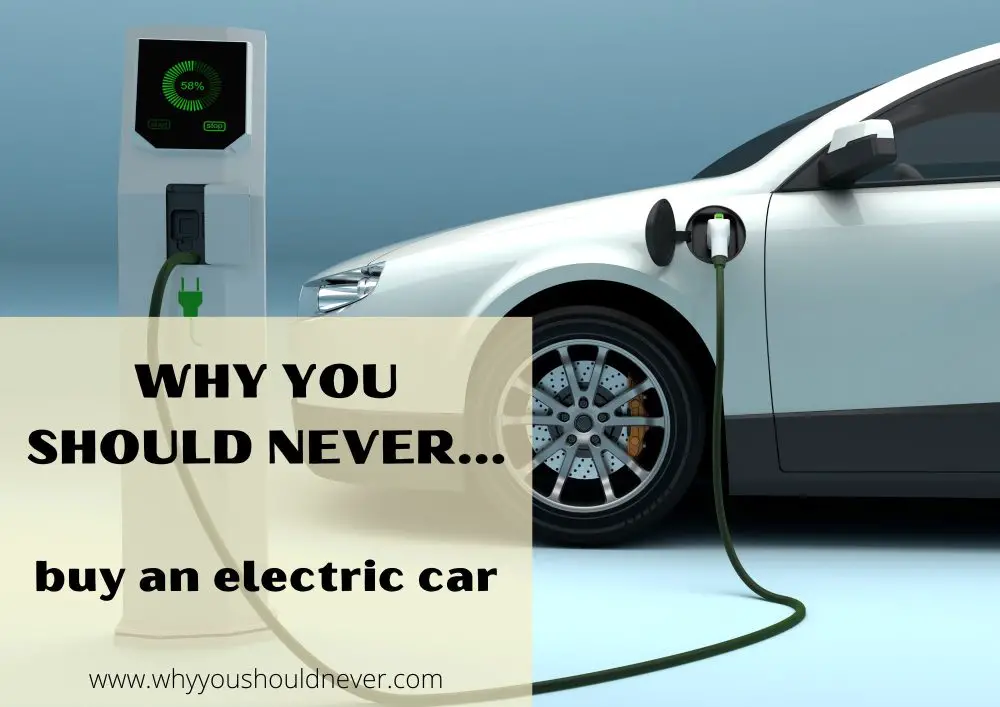![]()
Why You Should Never Buy An Electric Car
Unless you’ve been living under a rock for the past few years, you’ve probably noticed that electric cars are becoming more and more prevalent on the roads.
And while many people see this as a good thing—after all, electric cars are much better for the environment than traditional gas-powered cars—there are some drawbacks that you should be aware of before you make the switch from your trusty old clunker to a sleek new electric car.
In this article, we’ll explore why electric cars, though they’re often touted as the perfect solution to our environmental woes, may not be the best option for everyone.
7 reasons why you shouldn’t buy an electric car
1. They’re expensive
When it comes to buying an electric car, you’re going to have to fork over a lot more cash upfront than you would for a gas-powered car.
Even though the long-term costs of owning an electric car are lower—you’ll save money on things like fuel and maintenance—the initial purchase price is out of reach for many people.
The average cost of a new electric car in the United States is around $66,000, while the average cost of a new gas-powered car is just over $48,000. That means you’re looking at a difference of almost $20,000 before you even start driving!
2. They have a limited range
Another downside to electric cars is that they have a limited range. This means that if you’re planning on taking a road trip or driving long distances on a regular basis, an electric car might not be the best option for you.
Depending on the model of the electric car that you have, you could be looking at a range of anywhere from 100 to 300 miles before needing to recharge, which isn’t always practical for people who have to commute long distances for work or those who travel often.
3. They take a long time to charge
If you do find yourself needing to recharge your electric car while out on the road, be prepared to wait a while.
It can take anywhere from 30 minutes to 12 hours to charge an electric car, depending on the type of battery you have, the charger you’re using, and how much battery power your car has left.
A full charge in the average electric car will take roughly 8 hours. Can you imagine being stranded on the side of the road for that long waiting for your car to charge? No, we can’t either.
4. Charging stations aren’t as ubiquitous as gas stations
Another thing to keep in mind before making the switch to an electric car is that not all areas have charge stations readily available.
This means that if you live in a rural area or are planning on taking a road trip through remote parts of the country, finding a place to charge your car could prove difficult (or even impossible).
Even in major metropolitan areas, there won’t be as many charge stations as there are gas stations. This will change in the future as electric cars become more popular, but for now, it’s something to consider.
5. They’re not as eco-friendly as you might think
Electric cars, while much better for the environment than gas-powered cars, are not completely emissions-free.
The electricity that powers electric cars often comes from coal-fired power plants, which means that there is a significant carbon footprint associated with electric car ownership.
So, while electric cars are a step in the right direction when it comes to reducing our reliance on fossil fuels and protecting the environment, they’re still not perfect.
6. You might not be able to drive as fast
Another potential downside of owning an electric car is that you might not be able to go as fast as you could in a gas-powered car.
Electric cars often have lower top speeds than their gas-powered counterparts. Now, this might not be a big deal for some people, particularly as most countries have speed limits in place anyway.
But, if you’re someone who likes to let loose on the open road from time to time, an electric car might not be for you.
7. The best-looking cars are still gas-powered
Aesthetics are important. And although this is a matter of opinion, we think it’s worth mentioning that the best-looking cars on the market are still gas-powered.
As yet, electric cars haven’t quite managed to match the sleek lines and stylish design of some of the best gas-powered cars out there. Lamborghini is set to release its first fully electric car in 2028, but for now, we’ll have to stick with its gas-powered beauties.
Conclusion
Overall, there are plenty of reasons why owning an electric car isn’t always as great as it seems at first glance—especially when compared with traditional gas-powered cars.
From high upfront costs and limited range to long recharge times and a lack of charging stations, these are all major drawbacks that potential buyers should be aware of before making the switch from gas-powered vehicles to electric ones.
